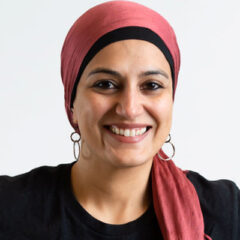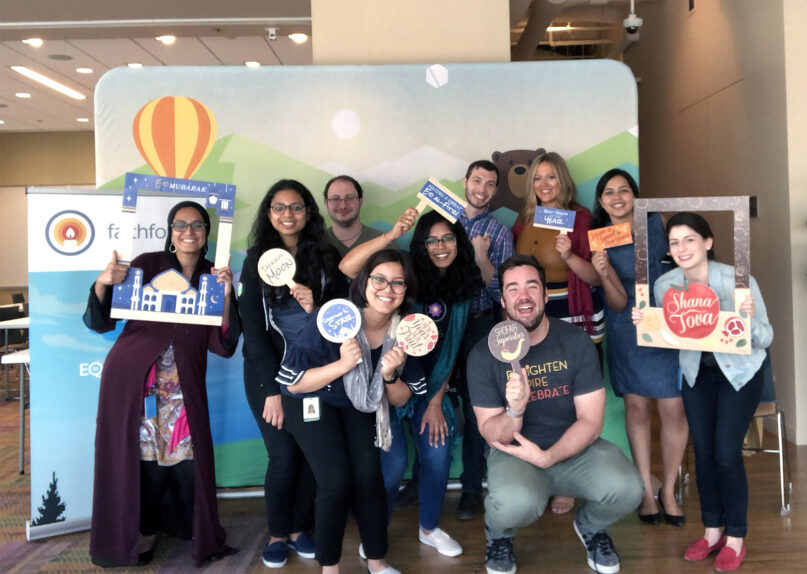(Interfaith America) — There are lots of ways to be an “only” at work; mine has always been my faith. I’m a visibly Muslim woman who’s been wearing a headscarf, aka hijab, since I was 16 years old, out of my own desire and love for my faith. In the month of Ramadan I fast in an office filled with free snacks, regular lunch meetings and all the coffee one’s heart can desire. I strive to pray five times a day, which can be hard when there’s no space to pray at work.
I don’t drink alcohol and feel a bit uncomfortable at bars and happy hours where much of the team building and socializing happens. And I eat meat, but only if it’s halal (that’s like the Muslim kosher), which basically means I’m a vegetarian at work.
I was born and raised in Miami, grew up watching Saturday morning cartoons and MTV, cheering for my hometown sports teams (Go Heat!), having birthday parties at Pizza Hut and watching Fourth of July fireworks each year with my Pakistani immigrant family. I’ve always thought of myself as 100% Muslim, 100% American, 100% normal.
But no matter how much I’ve wanted to belong and be seen as normal at work (what even is “normal”?!), at first glance, all people see is my otherness. There’s been a barrier between me and the majority of people I’ve worked with that, granted, at times existed only in my head — because my co-workers have generally been awesome human beings — but most of the time has been very real.
The barrier existed simply due to a lack of understanding about a piece of cloth on my head or other religious practices I observe. It existed because of limited exposure to meaningful interactions with people from different faiths and cultures and too much exposure to negative portrayals in news and media of people who look and believe like me. The barrier existed because everyone assumed you couldn’t talk about religion at work, or didn’t know how to talk about it, so stories and experiences like mine just weren’t heard, questions remained unasked and unanswered, and assumptions and biases remained unaddressed.
These barriers kept me from the belonging I was craving.
For a lot of people who come from different cultural or religious backgrounds, the choice at work sometimes becomes a choice between changing or hiding parts of who we are to fit in, which can potentially lead to more success in our careers.
Or it can be a choice to remain different — keeping that beard long, that turban or hijab or kippah on; not joining in on the happy hours or skipping out on the team lunch because you’re fasting, or because you have to make the Friday Jummah prayer, or because you have to make it home for Shabbat. All the while, you deal with the micro-aggressions, misconceptions and barriers that keep us from connecting with our co-workers and possibly keep us from moving up the corporate ladder. There’s a lot of pressure to conform or keep parts of ourselves hidden, and not a whole lot of support.
Enter Faithforce, the interfaith employee resource group at Salesforce, the San Francisco customer relationship software company.
Around three and a half years ago, I had a conversation with a wonderful person, who at the time was leading the employee resource group program at Salesforce (where we call them equality groups), in which we discussed the possibility of creating an interfaith employee resource group.
Salesforce already had nine amazing ERGs that supported different underrepresented groups and minorities and drove equality initiatives across the company. Groups like BOLDforce for the Black community, and Outforce for the LGBTQ+ community, to name a couple. I wanted to know if we could add one more to the mix. Could we make space for our faith identities when we talked about equality, allyship, representation and inclusion at work? Because as a person of faith, I needed all of those things too, and I knew I wasn’t the only one.
Along with another co-worker, a devout Christian based in Sydney, we set out to create an inclusive interfaith ERG, with the intent to give our diverse faith identities a voice and a seat at the equality table. Three years ago it was a dream. Today, Faithforce is a global employee resource group at Salesforce, with over 3,000 members across five continents, representing many different faith backgrounds and worldviews.
Faithforce grew out of a need for belonging, support and a deeper understanding of our religious diversity. It exists to knock down those invisible barriers between us and build bridges instead; to make our religious identities “normal” and OK to acknowledge and learn about. It’s about being able to be fully, comfortably and unapologetically *insert religious identity here*.
Just as important, it’s about helping all employees get comfortable stepping outside of their bubbles to better understand and respect the “other.” One of my favorite verses in the Quran says “Oh mankind! We created you from a single pair, and made you into nations and tribes so that you may know one another.” I take this verse to heart daily and can attest to the transformative power of simply getting to know someone who’s different from you.
As a Muslim, I get so much joy planning events for Passover, Easter and Holi with my Jewish, Christian and Hindu co-workers, and I learn so much in the process. I get so excited when my teammates join a Ramadan event I’m leading or when a senior leader actually asks me to share more about my holiday with her team. I no longer celebrate alone. It may seem like a trivial thing, but to have your manager and team wish you an Eid Mubarak or throw a Chag Sameach your way, to acknowledge a part of you that you hold dear, that matters.
When over 100,000 attendees walked into last year’s Dreamforce — one of the largest tech conferences in the world — they encountered halal, kosher and vegetarian meal options, and a multifaith meditation and prayer room open and accessible to all. No more worrying about what to eat or struggling to find a secluded corner to make your daily prayers in if you need to.
This is the impact an interfaith ERG can have when it has a seat at the table. This is faith inclusion at work.
Interfaith employee working groups also drive vocal and visible support for faith communities in times of need. After a tragic, hateful attack against your place of worship, instead of being greeted with silence at work the next day, you come in to find that leaders in your company actually stand with and support you. Managers and teammates ask if you’re all right and how they can help. Events are held in solidarity with faith communities, to respond to hate with education, love and support. Stories are heard that weren’t heard before, and these stories inspire hope and remind us that people of different faiths need allyship too.
This all goes to show that building an interfaith community at work is not only possible, but necessary. Over the past several years I’ve seen tremendous growth and interest in this space and have gotten to know leaders of interfaith and faith-based resource groups at other tech companies. While we each may do things a bit differently, in every group there has been an eagerness for interfaith support and collaboration that has helped the well-being of individuals as well as an added value to the diversity and inclusion efforts of the company.
In a world where misinformation and division thrive, be it on the internet, in media and entertainment, or in government, an interfaith ERG can actually help provide much-needed healing and make our workplaces safe and welcoming for all. It can bring us together to share our authentic stories to drive positive change across our companies, and do it alongside and in partnership with other ERGs working to do the same for the communities they support.

Farah Siddiqui. Courtesy photo
Faithforce and other interfaith ERGs remind us every day that we don’t have to change who we are to fit in. Another way is possible, where our religious diversity can be honored, and where we can respect, learn from and make space for one another. Where we all can be given the dignity that each one of us deserves.
(Farah Siddiqui, the co-founder and global president of Faithforce, also serves on the board of the Syrian Community Network the IL Muslim Civic Coalition. This article first appeared on Interfaith America, a website of the Interfaith Youth Core. The opinions expressed here do not necessarily reflect those of Religion News Service.)





